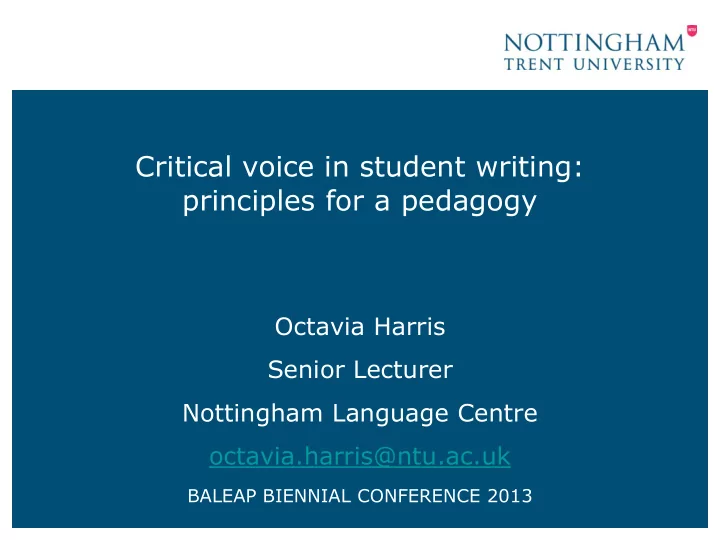

Critical voice in student writing: principles for a pedagogy Octavia Harris Senior Lecturer Nottingham Language Centre octavia.harris@ntu.ac.uk BALEAP BIENNIAL CONFERENCE 2013
• Personal • Unique • Individuality • Critical Voice 25 April 2013 2
What is critical voice? • Ideational, interpersonal, textual positioning (Ivanic and Camps, 2001). • Reasoned propositions (Moon, 2004). • Stance and engagement (Hyland, 2005). 25 April 2013 3
Critical voice: issues in student writing • Higher education to develop disposition of criticality (Barnett, 1997). • Unsupported assertions linked to lower grades/voice v’s evidence/not sure how much voice to include/unequal power relationship (Read et al. 2001). • Authorial identity (Pittam et al., 2009). 25 April 2013 4
Background to the study Action research Student writers: Six in-sessional MA ELT Cycle 1: semi-structured interviews, focus groups, talk around text Preliminary findings: • Desire to express voice but not sure how • Evidence dominates voice • Excludes voice if no supporting evidence • Reluctant to be critical of evidence with voice Cycle 2: Design pedagogy 25 April 2013 5
Research Questions 1. What constitutes a pedagogy of critical self- reflection? 2. What are the processes, experiences and difficulties for students in developing a critical voice? 25 April 2013 6
Research Questions continued 3. How can a pedagogy of critical self-reflection contribute to EAP staff understanding the processes, experiences and difficulties involved in the development of a critical voice? Question for the researcher 4. How can the researcher develop critical voice in dialogue and written feedback? 25 April 2013 7
Overview of Principles of Pedagogy 1. To raise awareness of constructions and reconstructions of knowledge: individually and collaboratively. 2. To raise awareness of critical self-reflection. 3. To develop critical voice in writing. 25 April 2013 8
1. To raise awareness of constructions and reconstructions of knowledge: individually and collaboratively. Social constructivist approach • Reality is socially and experientially constructed (Guba and Lincoln, 1994). • Reality is pluralistic, plastic and emic ‘the complex world of lived experience from the point of view of those who live it’ (Schwandt, 1994). • Expressed through language (Holquist 1990; Schwandt, 1994). 25 April 2013 9
What is being constructed? Knowledge consists of: • Understanding the world • Constructing concepts, meaning-making • Reconstruction – new experiences • Validity of knowledge is valid (Schwandt, 1994). 25 April 2013 10
How is knowledge constructed? Actively engaging in dialogue • Dialogue Holquist(Bakhtin, 1990). • Critical dialectical discourse (Mezirow, 2008). • Communicative learning (Habermas, 1981). • Collaborative (Bruffe, 1999). 25 April 2013 11
2. To raise awareness of critical self- reflection and critical reflection in collaborative dialogue • Epistemic critical self-reflection of assumptions and (Mezirow, 1998) and justified propositions , group work (Mezirow, 2003). • Social constructionist approach to reflexivity is relational in group work (Gergen and Gergen, 1991). • Reflexivity and knowledge: deconstruction of knowledge through postmodernist/poststructual thinking (Fook, 2004). 25 April 2013 12
The individual and collaborative dialogue Constructivist pedagogies (von Glaserfeld, 1995) Construction and reconstruction of reality Critical self-reflection Deconstruction Collaborative dialogue 25 April 2013 13
Pedagogy of critical voice Critical friends: Reciprocal Construction of knowledge questioning Critical self reflection Development of critical voice 25 April 2013 14
3. To develop critical voice in writing • Self representation (Ivanic, 1998). • Stance towards author (Matusda and Tardy, 2007). • Reader-writer relationship (Hyland, 2001). 25 April 2013 15
References Barnett, R. 1997. Higher education: A critical business. Buckingham: Open University Press. Bruffee, K. A. 1999. Collaborative Learning Higher Education, Independence and the Authority of Knowledge. Baltimore: John Hopkins University Press. Fook, J. 2004. Critical reflection and transformative possibilities. Eds. Davies, L., and Leonard, P. In Social work in a corporate era: practices of power and resistance. p.16-30. England: Ashgate Publishing Limited. Gergen, J. K., and Gergen, M.M. 1991. Toward reflexive methodologies. In eds. Stierer, F. Research and reflexivity. London: Sage Publications. Guba, E. G., and Lincoln, Y. S.1994. Competing paradigms in qualitative research. In Denzin, N. K., and Lincoln, Y. S. (Eds.), Handbook of qualitative research. P.118-137. Thousand Oaks, CA: Sage. 25 April 2013 16
Habermas, J. 1981. The theory of communicative action . London: Heinemann. Holquist, M. 1990. Dialogism . London: Routledge. Hyland, K. 2001. Bringing in the reader. Written Communication. 18: 549-574. Hyland, K. 2005. Stance and engagement: a model of interaction in academic discourse. Discourse studies. 7: 2, 173-192. Ivanic, R. 1998. Writing and identity the discoursal construction of identity in academic writing. Amsterdam: Benjamins. Ivanic, R., and Camps D. 2001. I am how I sound Voice as self- representation in L2 writing. Journal of second language writing. 10, 3-33. 25 April 2013 17
Matsuda, P. K., and Tardy, C. M. 2007. Voice in academic writing: The rhetorical construction of author identity in blind manuscript review. English for Specific Purposes. 26: 235 – 249. Mezirow, J. 1998. On critical reflection. Adult Education Quarterly . 48 3 185-198. Mezirow, J. 2003. Transformative Learning as Discourse. Journal of Transformative Education. 2003 1: 5. Moon, J. 2004. A handbook of reflective and experiential learning: theory and practice. London: Routledge Falmer. Pittam, G, Elander, J., Lusher, J. Fox, P., and Payne, N. 2009. Student beliefs and attitudes about authorial identity in academic writing. Studies in Higher Education. 34, 2, 153-170. 25 April 2013 18
Read, B., Francis, B., and Robson, J. 2001. ‘Playing safe’: undergraduate essay writing and the presentation of the student voice. British Journal of Sociology of Education. 22: 3, 387-399. Scott, M. 2000. Student, Critic and Literary Text. A discussion of ‘critical thinking’ in a student essay. Teaching in Higher Education. 5, 3, 277-288. Schwandt, T. A. 1994. Constructivist, interpretivist approaches to human inquiry. In Denzin, N. K., and Lincoln, Y. S. (Eds.), Handbook of qualitative research. P.118-137. Thousand Oaks, CA: Sage. von Glaserfeld, E. 1995. A constructivist approach to teaching. In Steffe, L. P., and Gale, J. eds. Constructivism in education . p 13-15. Hillsdale, NJ: Lawrence Erlbaum. 25 April 2013 19
Recommend
More recommend